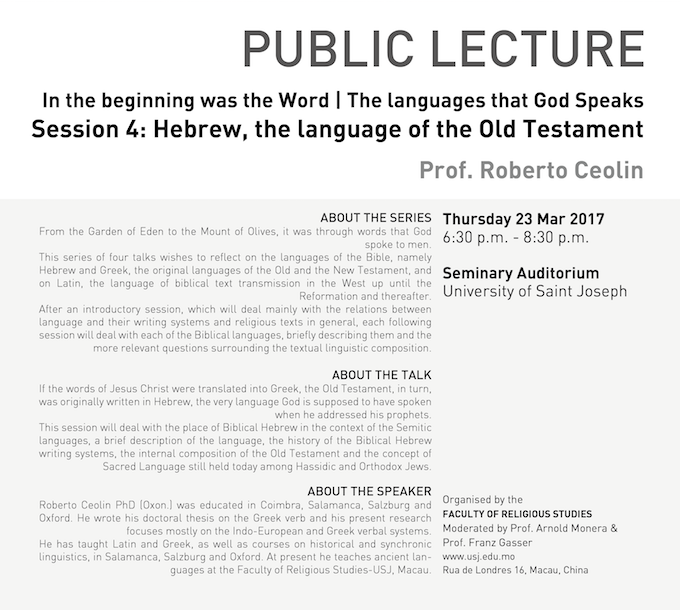Public Lecture: In the beginning was the Word | The languages that God Speaks

Public Lecture: In the beginning was the Word | The languages that God Speaks
23
Mar
Public Lecture: In the beginning was the Word | The languages that God Speaks
Session 4: Hebrew, the language of the Old Testament on 23rd March 2017

From the Garden of Eden to the Mount of Olives, it was through words that God spoke to men.
This series of four talks wishes to reflect on the languages of the Bible, namely Hebrew and Greek, the original languages of the Old and the New Testament, and on Latin, the language of biblical text transmission in the West up until the Reformation and thereafter.
After an introductory session, which will deal mainly with the relations between language and their writing systems and religious texts in general, each following session will deal with each of the Biblical languages, briefly describing them and the more relevant questions surrounding the textual linguistic composition.
About the Talk: Session 4: Hebrew, the language of the Old Testament (23rd Mar 2017)
If the words of Jesus Christ were translated into Greek, the Old Testament, in turn, was originally written in Hebrew, the very language God is supposed to have spoken when he addressed his prophets.
This session will deal with the place of Biblical Hebrew in the context of the Semitic languages, a brief description of the language, the history of the Biblical Hebrew writing systems, the internal composition of the Old Testament and the concept of Sacred Language still held today among Hassidic and Orthodox Jews.
About the Speaker
Roberto Ceolin PhD (Oxon.) was educated in Coimbra, Salamanca, Salzburg and Oxford. He wrote his doctoral thesis on the Greek verb and his present research focuses mostly on the Indo-European and Greek verbal systems.
He has taught Latin and Greek, as well as courses on historical and synchronic linguistics, in Salamanca, Salzburg and Oxford. At present he teaches ancient languages at the Faculty of Religious Studies-USJ, Macau.









